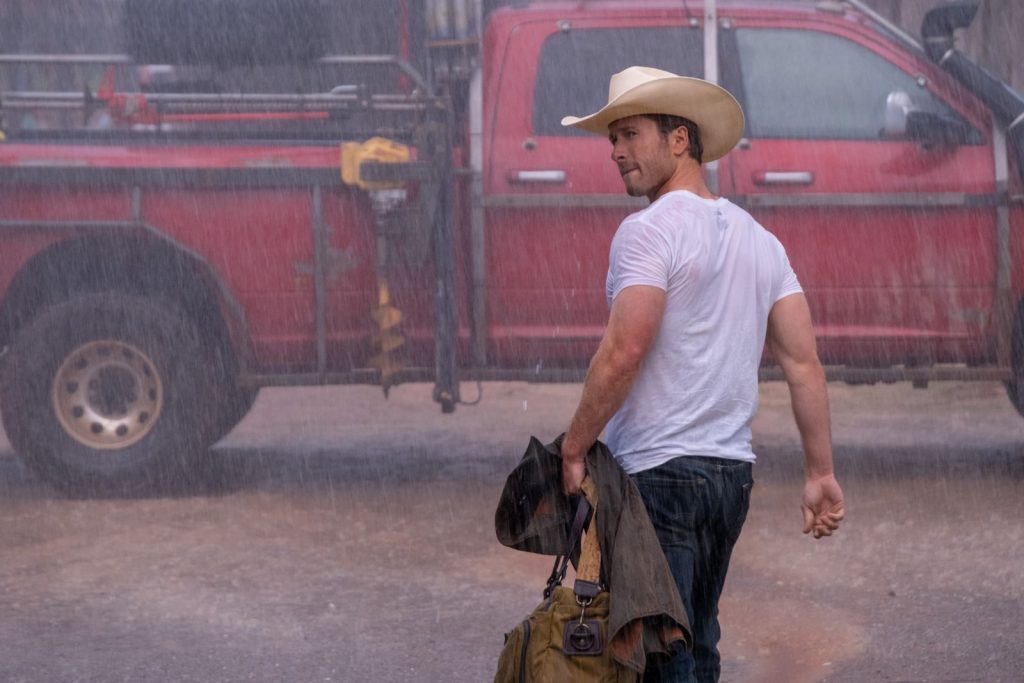Reviews include The Apprentice, Piece by Piece, and Woman of the Hour.
TFCA Friday: Week of July 19
July 19, 2024

Welcome to TFCA Friday, a weekly round-up of film reviews and articles by TFCA members.
In Release this Week
Cora Bora (dir. Hannah Pearl Utt)
“If you know Stalter from HBO’s Hacks then you know the general territory. In this case, the whole movie is Stalter and while her bizarre charm is formidable, it’s not quite enough to carry everything — a stronger script might have helped,” says Liz Braun at Original Cin. “Badly organized, dithering, and dissembling, deluded about her singing talent and dancing through it all by the seat of her pants, Cora is fabulously annoying and weird. And yet simultaneously attractive. That must be because of her self-confidence, which is as unexpected and confusing as everything else about her.”
The Dead Don’t Hurt (dir. Viggo Mortensen)
“A bit disorienting at first as the story unveils in non-chronological order without titles, the tactic forces the audience to think a bit and puts all the pieces into place,” notes Gilbert Seah at Afro Toronto. “Necessarily violent, this is a violent revenge western. Director Mortensen sets up all the injustices committed toward the couple before exacting the well-deserved revenge that would have the audience cheering.”
Midnight Taxi (dir. Bertie Speirs and Samantha Speirs; July 23)
“The shift in look and atmosphere from a clear and polished London slowly deteriorates as the film progresses neatly into another different world, though existing in the same city,” writes Gilbert Seah at Afro Toronto. Midnight Taxi, written and directed by Bertie Speirs and Samantha Speirs in an impressive debut.”
National Anthem (dir. Luke Gilford)
“As he begins frequenting rodeos and drag shows, Dylan’s attraction to Sky surges – expressed as sexy vignettes in which he envisions her draped over a horse and donning an American flag – and a shrooms-induced midnight tryst with him, Sky and Pepe complicates the trio’s dynamics,” notes Saffron Maeve at The Globe and Mail. “Plummer is extraordinary in the role, with his pained, suppressive demeanour eventually giving rise to full-bodied smiles. He does not play Dylan as sitting in the pocket of shame, but rather, exhausted and seeking liberation from his regimen, which he finds in his own queerness.”
“Luke Gilford’s National Anthem, pastoral queer love story, sets us down on a ranch run by a LGBTQ1A2 community, a place they can be free and live their lives in full, with companionship and support from one another,” writes Anne Brodie at What She Said. “The pastoral, lyrical framework, sensitive cinematography and direction are gentle, but the film has impact. Its unhurried pace lends realism as Dylan sorts himself out and begins his journey of awakening and acceptance. What seems initially a slight film really lands with power.”
“Of course, not everything will go smoothly for our young protagonist; there’s a hint of a threat when Pepe tells him that he can’t stay at the ranch forever. But National Anthem finds a way to steer the story past cliche and into something that feels real,” says Chris Knight at Original Cin. “Little wonder that Gilford was a photographer before he became a filmmaker; he produced a photo exhibit in 2020 chronicling the International Gay Rodeo Association. National Anthem seems primarily interested in the play of light on human skin, horsehides, and the vast New Mexico landscape. Story comes second, but it’s definitely there, and it’s a good one.”
At POV Magazine, Pat Mullen looks at the photography roots of two of this summer’s movies, National Anthem and The Bikeriders: “While National Anthem and The Bikeriders have little in common upon first glance, they reveal more upon closer inspection of their photography roots. Both films add to the expanding malleability of fiction and non-fiction filmmaking as Gilford and Nichols navigate the lived experiences of the people who gave their likeness to iconic photographs and, in turn, moving pictures. From cowboys to easy riders, they tell stories of lives too often left outside the frame, ironically by filmmakers who were inspired to expand stories housed within a single shot.”
New Strains (dir. Artemis Shaw and Prashanth Kamalakanthan)
“New Strains exits more as a curiosity piece than filmed entertainment. One could admire filmmakers Artemis Shaw and Prashanth Kamalakanthan for their guerrilla no-budget filmmaking but even at 80 minutes, enough is enough. ‘Like’ stop it already, ‘like’. To listen to the two leads speaking using the word ‘like’ all the time is pure torture,” writes Gilbert Seah at Afro Toronto.
Scala (dir. Ali Catterall and Jane Giles)
“Scala is for those who love cinema, especially its weirdness and all,” declares Gilbert Seah at Afro Toronto.
Skywalkers: A Love Story (dir. Jeff Zimbalist)
“Skywalkers: A Love Story lives up to both aspects of its title, providing a deeply human tale along with the climbing moments we experience through proxy,” says Jason Gorber at POV Magazine. “Combined audiences are treated to quite a ride, with our hearts are lifted almost as much as the iconic image that the entire story line leads up to. Part action film, part romantic drama, part rom-com, and part travelogue, these disparate elements combine thanks to Zimbalist’s assured filmmaking. It’s certain to be one of the most adored documentaries of the year.”
“Skywalkers: A Love Story, the new doc has all the elements of a very entertaining fiction blockbuster action, thrills, suspense, romance, humour, and emotion,” says Gilbert Seah at Afro Toronto. “And all true!”
“Skywalkers invites comparison to Man on Wire with a dash of Fire of Love for its thrilling storytelling at such great heights, but thanks to contemporary technology, the film lets audiences accompany the thrill-seekers along every step of the way. All the footage of the risky shoots comes thanks to Nikolau and Beerkus, who navigate the logistics of their photography throughout the film, including using drone shots to afford the awesome sense of scale,” writes Pat Mullen at POV Magazine. “This film in no way endorses the duo’s risky behaviour, as many of Nikolau’s friends plunge to their deaths over the course of production and the reality of the risk both rattles and fuels her. Similarly, Skywalkers features edge-of-your-seat viewing as the photographers ascend rickety buildings nimbly but perilously. The film takes audiences to heights one might never see, nor wish to experience, in real life.”
Twisters (dir. Lee Isaac Chung)
“For everything exemplary within the film, I can’t say I’m convinced that Twisters was at all necessary — it just doesn’t offer anything significantly new from the original, other than bringing it into the 2020s,” writes Rachel Ho at Exclaim!. “The idea that a movie requires an upgrade suggests that modern-day audiences can’t be moved by a film not created in their on time — a perspective that does viewers a great disservice. However, this is the reality of Hollywood at the moment, and if we are going down this route, Twisters at least serves as a great example of how to tackle this needless exercise in an entertaining and compelling manner.”
“But sometimes lightning does strike twice,” counters Chris Knight at the National Post. “Look at Top Gun: Maverick, Mad Max: Fury Road or even Blade Runner 2049. And then go see Twisters, which mixes the charms of the original – rival teams of tornado chasers with a little comedy and romance on the side – and adds just enough novelty to keep you glued to your seat, before blowing you out of it…Tyler is played by Glen Powell, rivalling the on-screen weather as the movie’s greatest force of nature. This is possibly the only human alive who could go through an EF5 tornado and come out the other side looking somehow even more handsome.”
“Twisters is loaded with action set pieces, among them a wind farm torn to shreds of metal by an advancing storm, and a scene involving a motel swimming pool that’s reminiscent of the collapsing-home heroics of the ’96 tornado flick,” notes Peter Howell at the Toronto Star. “But here’s the odd thing about Twisters: While the storms are more realistic thanks to advanced CGI, they don’t have more wow power than the original film’s. Audiences back then were more impressed by the era’s primitive special effects than the CGI-saturated moviegoers of today will likely be. And there’s no flying cow in the new film, as there was in Twister, arguably that film’s most ‘omigod’ moment.” Howell also chats with director Lee Isaac Chung and learns why he didn’t include the cow in his disaster movie: “When I talked to people about the first Twister and what I was doing, they’d say, ‘Oh, the cow movie!’” Chung tells Howell. “And I just didn’t want to make a movie where my family would just keep saying, ‘Oh, you made a cow movie!’ I think that was kind of what drove that decision.”
“While it follows the previous film’s general roadmap — two competing teams chase the mother of all tornados across Oklahoma for different reasons — Twisters also refuses to kow-tow to its ancestry, offering few referential winks and zero cameos from its surviving cast members. That’s maybe good, maybe disappointing depending on one’s expectations,” says Kim Hughes at Original Cin. “As a summertime popcorn film, it’s fine. But Twisters lacks the breathtaking je ne sais quoi oomph a film of this scope should have. We get spun alright, but the landing feels very safe and predictable.”
“Twisters has all the elements required for a successful Hollywood blockbuster,” says Gilbert Seah at Afro Toronto. “Firstly, it has a huge budget of $200 million, superb special effects, impressive modern technology, and is already a tested success, following the success of the highly profitable Twister back when, though this film can be considered as a standalone non-sequel. There is a villain, the buyer of cheap land devastated by tornadoes, with a plot involving saving the world (by the destruction of tornadoes) and chasing a dream come true of an invention if it works. In addition, there is a romance complete Harlequin style with a chase of the almost got-away lover at the airport.”
“While the romance in Twisters would have been stronger with a more committed performance by Daisy Edgar-Jones, the special f/x do gargantuan work,” says Marc Glassman at Classical FM. “The intensity of the tornadoes is conveyed superbly, and you get the sense that it’s all building to a doozy of a finale. The set piece—an awesome tornado— is brilliant, striking down a small Oklahoma town in a terrifying scene. In a stunning sequence, the locals take refuge in a cinema, which gets torn up while Bride of Frankenstein is playing. It’s an exemplary last hurrah.”
“Twisters isn’t doing anything new, but it is a good time at the movies,” says Joe Lipsett at Queer Horror Movies.
Widow Clicquot (dir. Thomas Napper)
“It may not sound like a big deal, but it’s actually very satisfying to see game-changing historical women having their stories told on a major platform and having them told well, with emotional intelligence,” observes Kim Hughes at Original Cin. “Crop damage, spoilage, sexism, war, and purchase fulfillment issues, to name five, converged upon the winemaker as she relentlessly tinkered with her product, eventually hitting the fermentation jackpot and giving the champagne its unique look, flavour, and intense bubbles… The knowledge of a woman making her way in a world structurally designed to pin her to a rigid, subversive male ideal is exhilarating even if some liberties are taken in the name of dramatic thrust.”
“Mme Clicquot had always been the heart and soul of the champagne an important “nose”; when in charge made far-ranging strategic changes that restored the vineyard and the chance to come out of financial ruin. It was a long, hard fight – hopeful buyers charged her with running a “criminal enterprise” for shipping cases around Napoleon’s blockade – but she had a savvy friend (Sam Riley) who encouraged her and a young, loyal accountant who admired her instincts,” writes Anne Brodie at What She Said. “Mme Clicquot dashed old-fashioned business practices for new, effective methods, including encouraging collaboration, and the brand that she elevated lives on today. Given the rolling vineyards of France as a stunning locale, an exciting, Barry Lyndon-esque score, and Bennett’s magnetic presence the TIFF favourite about early, dangerous feminism and the brave soul who abided is unusual and welcome.”
“Widow Clicquot offers a great vehicle for the talented Haley Bennett, who makes the most of the titular lead. She has many roles to play—lover to an adored husband, mistress to others, mother to her aggrieved daughter, faithful daughter-in-law; ally to her associate Bohne—and Bennett acquits herself well,” notes Marc Glassman at Classical FM. “If there’s a flaw in the film, it’s the matter of language. This is an odd film to be made in English since the subject and story is so profoundly French.”
“A biopic with all the elements of prestige but not much in the way of confidence or artistry, the film chronicles the real-life story of Barbe-Nicole Ponsardin, who at just 27 years old became the ‘Grande Dame of Champagne’ following the death of her husband, the proprietor of the Clicquot winery at the turn of the 19th century,” says Barry Hertz at The Globe and Mail. “Here, the whole affair is stultifyingly self-serious in that British stiff-upper-lip manner. As a result, an extraordinarily French story is flattened into conventional Euro-pudding nothingness. There is little here to surprise, less to even expect and still savour.”
Young Woman and the Sea (dir. Joachim Rønning)
“Trudy made the swim and came home to Manhattan to the biggest-ever ticker tape parade for a woman. What a story; it’s a shame it’s interpreted in a conventional fashion. It stands on its own but manipulative editing, score, and direction overwhelm it,” admits Anne Brodie at What She Said. “After all Trudy conquered the many constraints against her at a time when women had little agency, showing the world how it’s done. That’s the story. It stands on its own, without the frills. Ridley’s performance and athleticism are top-notch and it’s good to know about Trudy’s pioneering ways.”
“Young Woman and the Sea gives Ridley a role that’s as demanding physically as it is emotionally. The Star Wars ingénue tackles it remarkably and finds in Ederle her best part to date,” writes Pat Mullen at That Shelf, who gets some words from Ridley, director Joachim Rønning, and producer Jerry Bruckheimer. “‘I was like a duck,” Ridley says. ‘You have to squish. Everything up here was fine,’ she says, gesturing to her upper body, ‘and everything down below the water was, like, panic.’”
File Under Miscellaneous
At The Globe and Mail, Barry Hertz investigates the forced price-hike of “premium format movies” that inspire audiences to reconsider how badly they want to see a movie if it costs a few extra bucks: “PLF doesn’t only change the math for consumers, but also filmmakers,” writes Hertz. “As the formats grow in popularity and additive experience – CJ 4DPLEX has more than 390 ScreenX and 790 4DX screens around the world – the kinds of movies that actually get green-lit could change. For the past decade, the big studios have been shifting away from middle-budget comedies and dramas – the PLF boom could be the trigger to get them to focus solely on supersized spectacles.” And for audiences who prefer the small screen at home, Hertz picks some Miami-set films available for streaming at no extra charge.
Also at The Globe and Mail, Barry Hertz looks at the situation for the Toronto Outdoor Picture Show, which is the latest film festival sounding the alarm. “‘There’s never been a moment like this where we’re in the middle of the summer and we know the results to all our funding applications and it’s all bad news,’ says [Emily] Reid, who notes that TOPS needs $70,000 in additional funding to cover its annual budget of about $570,000 and plan its 2025 edition. ‘We don’t want to join the chorus of arts organizations sounding the alarm, but it’s by far the absolute worst it has ever been.’”
A Festival of Festival Coverage: The TIFF Opener and Female Eye
At The Global and Mail, Barry Hertz explains why TIFF’s opening night selection of David Gordon Green’s Nutcrackers could be a smart choice. “Nutcrackers’ current lack of distribution makes it a subtly sly opening-night choice, given TIFF’s ambitions as an organization,” writes Hertz. “Earlier this spring, festival organizers announced plans to launch what they say will be a ‘game-changing’ official content market in 2026, an initiative made possible thanks to $23-million in funding from the federal government. If Nutcrackers lands a big distribution deal coming off of its TIFF debut, then the festival will have just one more bargaining chip in its hands to convince the global film industry that it can serve as the premiere North American hub for buying and selling movies.”
At Northern Stars, Thom Ernst looks at Valerie Buhagiar’s The Dogs, which screens at the Female Eye Film Festival. “Touches of Buhagiar’s previous films are tucked into the crevasses and seams of the story, characters whose basic humanity is left to battle threats of distrust and despondency,” says Ernst. “And here, too, are the foundations frequently felt in Buhagiar’s work of unity, even in a world of abandonment and hope in the face of despair. This might be Buhagiar’s most accessible venture to date. Yet I worry that the term ‘accessible’ suggests something formulaic and safe. Because that’s not the case with The Dogs. Screenwriters Anthony Artibello’s and Sheila Rogerson’s script plays along the edge of fantasy and authenticity, a daring merge of mystery, social drama, and the paranormal.”
TV Talk/Series Stuff
At What She Said, Anne Brodie advises that Omnivore will have audiences hungry for seconds: “That whimsy and thirst for knowledge and reflection bring new meaning to the food documentary. Redzepi’s response to sharing Boot Orange Copenhagen chilies, ‘the hottest thing ever bred,’ with his staff and customers is telling. ‘It is masochism. Embrace the hurt. Wait for the endorphins to kick in.’ In Bangkok on the other side of the world, a couple experiences the Prik Kee Noo chili at 100k on the Scoville scale; they report being suddenly happy and keen to have sex. Redzepi dedicates himself to the everyday items that changed the world – think coffee – and the transformative powers of what we eat and drink.” Meanwhile, Lady in the Lake proves as hot as the aforementioned chili: “It feels radical and explosive; reflecting systemic racism in the city.” Brodie also looks into the boy band scam of Dirty Pop: “It’s not news. Pop stars, actors, and folks with stars in their eyes have stepped into the limelight with promises of wealth and power, and have often been manipulated, robbed, and screwed over by unscrupulous admin.”



